Simple Present Tense Passive Voice
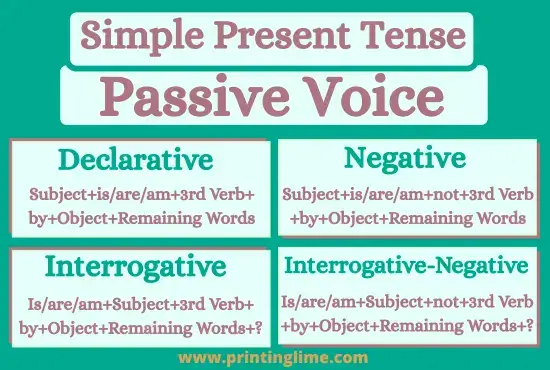
Simple Present Tense Passive Voice also known as Present Indefinite Tense Passive Voice, because it is used to show the habitual present actions done on th object by the doer. These sentences use “is/are/am” as helping verbs with the 3rd form of the verb.
The passive voice form of the simple present tense is used to represent the habitual present states/actions of the doer. You can change the active voice sentences into passive voice form by following the below-mentioned general rules.
Simple Present Tense Passive Voice Rules
Follow the following general rules to convert the active voice form into the passive voice form.
- First, convert the object of the active voice sentence into the subject of the passive voice sentence.
- Then, use “is/are/am” as a helping verb with respective singular or plural noun or pronoun.
- Then, use the 3rd form of the verb to indicate the passive state of the action.
- After this, use the preposition “by” to show the actual doer of the action.
- Then, convert the subject of the active voice sentence into the object of the passive voice sentence.
- At the end, write the remaining words, if there are any, in the active voice sentence.
Helping Verbs of Simple Present Tense (Passive Voice)
Passive voice sentences of simple present tense use the following 3 helping verbs with the respective singular and plural numbers of nouns and pronouns.
“Is” as Helping Verb in Simple Present Tense (Passive Voice) Sentences
“Is” is used as a helping verb in passive voice sentences of simple present tense with singular nouns and pronouns (he, she, it). Thus, these sentences with “is” as a helping verb follow the following sentence formula.
He/she/it/singular noun + is + 3rd verb + by + object + Remaining Words

Following are some examples of passive sentences with “is” as a helping verb.
- They invite him to the annual meeting every year.
- He is invited to the annual meeting every year. (Passive Voice)
- The teacher praises her for her excellent performance.
- She is praised for her excellent performance. (Passive Voice)
- The janitor cleans the classroom daily.
- The classroom is cleaned by the janitor daily. (Passive Voice)
- His father washes the car every Sunday.
- The car is washed every Sunday by his father. (Passive Voice)
- Many students read the book.
- The book is read by many students. (Passive Voice)
“Are” as Helping Verb in Simple Present Tense (Passive Voice) Sentences
“Are” is used as a helping verb with plural nouns and pronouns (we, you, they) to express the habitual actions done by the doer. So, passive voice sentences with “are” have the following sentence structure.
We/you/they/plural noun + are + 3rd Verb + by + Object + Remaining Words

Following are some examples of passive present habitual sentences having “are” as a helping verb.
- Our teacher teaches us English.
- We are taught English by our teacher. (Passive Voice)
- Doctors advise you to exercise daily.
- You are advised to exercise daily by doctors. (Passive Voice)
- The host invites them to the wedding.
- They are invited by the host to the wedding. (Passive Voice)
- The teacher gives homework to the students every day.
- The students are given homework by the teacher every day. (Passive Voice)
- The gardener waters the flowers every morning.
- The flowers are watered by the gardenerevery morning . (Passive Voice)
“Am” as Helping Verb in Simple Present Tense (Passive Voice) Sentences
“Am” is used as a helping verb with only the personal singular pronoun “I” to express the action being done on oneself. Thus, passive voice simple present tense sentences with “am” as the helping verb have the following sentence formula.
I + am + 3rd Verb + by + Object + Remaining Words
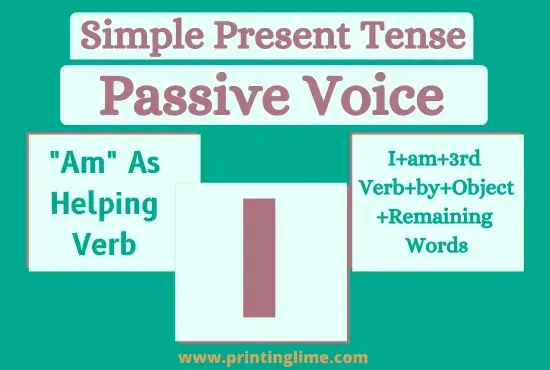
The following passive sentences have “am” as a helping verb.
- They invite me to the annual conference.
- I am invited to the annual conference. (Passive Voice)
- The company pays me every Friday for my work.
- I am paid every Friday for my work. (Passive Voice)
- My instructor teaches me piano.
- I am taught piano by my instructor. (Passive Voice)
- My boss gives me new projects every month.
- I am given new projects every month. (Passive Voice)
- People appreciate me for my creativity.
- I am appreciated for my creativity. (Passive Voice)
Simple Present Tense Passive Voice Formula
Following is the basic sentence structure for declarative, negative, interrogative, and interrogative-negative sentences of the simple present tense (passive voice).
Declarative Sentence Formula of Simple Present Tense Passive Voice
Declarative Sentences of Passive Simple Present Tense/Present Indefinite Tense uses “is/are/am” as helping verbs with respective singular and plural nouns and pronouns. These assertive habitual passive present sentences have the following sentence formula.
I/we/you/they/he/she/it/noun + is/are/am + 3rd Verb + by + Object + Remaining Words
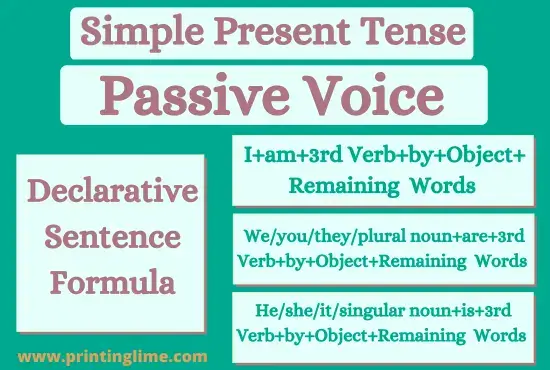
Examples of Declarative Sentences of Simple Present Tense Passive Voice
Following are some examples of declarative sentences in the simple present tense (passive voice).
- The postman delivers the letters every morning.
- The letters are delivered by the postman every morning. (Passive Voice)
- The maid cleans the floor daily.
- The floor is cleaned by the maid daily. (Passive Voice)
- The vegetables are washed before cooking.
- People wash the vegetables before cooking. (Passive Voice)
- The engineers inspect the bridge every week.
- The bridge is inspected by the engineers every week. (Passive Voice)
- The airport staff makes the announcements.
- The announcements are made by the airport staff. (Passive Voice)
- The teacher checks the homework regularly.
- The homework is checked by the teacher regularly. (Passive Voice)
- Millions of people read the news every day.
- The news is read by millions of people every day. (Passive Voice)
- The host serves tea to the guests in the evening.
- The guests are served tea in the evening.(Passive Voice)
- The gardener waters the flowers every morning.
- The flowers are watered by the gardener every morning. (Passive Voice)
- The developer updates the website frequently.
- The website is updated by the developer frequently. (Passive Voice)
Negative Sentence Formula of Simple Present Tense Passive Voice
Negative sentences use “not” after helping verbs “is/are/am.” These negative sentences in passive voice form have the following general formula.
I/we/you/they/he/she/it/noun + is/are/am + not + 3rd Verb + by + Object + Remaining Words
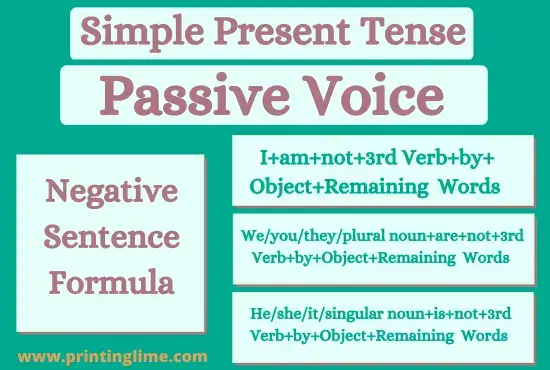
Examples of Negative Sentences of Simple Present Tense Passive Voice
Following are some examples of negative sentences in the simple present tense (passive voice).
- The maid does not clean the room every day.
- The room is not cleaned by the maid every day.
- The assistant does not prepare the reports on time.
- The reports are not prepared by the assistant on time.
- The washerman does not wash the clothes properly.
- The clothes are not washed by the washerman properly.
- The students do not sing the songs during assembly.
- The students do not sing the songs during assembly.
- The shopkeeper does not sell vegetables on Sundays.
- The vegetables are not sold by the shopkeeper on Sundays.
- I do not wash the dishes after dinner.
- The dishes are not washed by me after dinner.
- The teacher does not explain the lessons clearly.
- The lessons are not explained by the teacher clearly.
- The mechanic does not repair the machines on weekends.
- The machines are not repaired by the mechanic on weekends.
- The clerk does not update the files regularly.
- The files are not updated by the clerk regularly.
- The travel agent does not print the tickets immediately.
- The tickets are not printed by the travel agent immediately.
Interrogative Sentence Formula of Simple Present Tense Passive Voice
“Is/are/am” comes at the start of the interrogative sentences to show the questionability of the action being done by the doer. Interrogative sentences of Simple Present Tense (Passive Voice) have the following sentence structural formula.
Is/are/am + I/we/you/they/he/she/it/noun + 3rd verb + by + Object + Remaining Words + ?
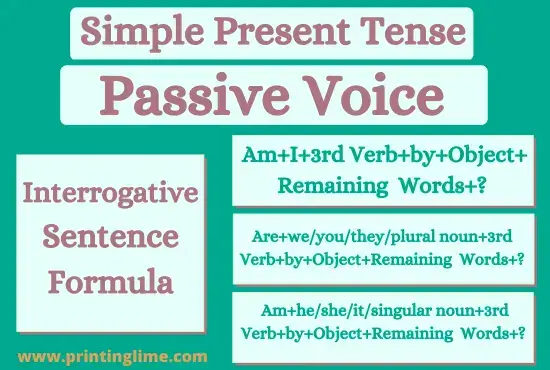
Examples of Interrogative Sentences of Simple Present Tense Passive Voice
Following are some examples of interrogative sentences in the simple present tense (passive voice).
- Does the maid clean the room every morning?
- Is the room cleaned by the maid every morning?
- Does the manager check the documents before approval?
- Are the documents checked by the manager before approval?
- Does the driver wash the car daily?
- Is the car washed by the driver daily?
- Does the chef bake the cakes in this bakery?
- Are the cakes baked by the chef in this bakery?
- Does the student do the homework regularly?
- Is the homework done by the student regularly?
- Does the postman deliver the letters on time?
- Are the letters delivered by the postman on time?
- Does the gardener water the garden every evening?
- Is the garden watered by the gardener every evening?
- Do the passengers reserve the seats online?
- Are the seats reserved by the passengers online?
- Does the technician operate the machine properly?
- Is the machine operated by the technician properly?
- Do the staff wrap the gifts before delivery?
- Are the gifts wrapped by the staff before delivery?
Interrogative-Negative Sentence Formula of Simple Present Tense Passive Voice
Interrogative-negative sentences in simple present tense (passive voice) take “is/are/am” at the start of sentences, and “not” comes after the subject of passive voice sentences. These interrogative as well as negative sentences have the following general structural formula.
Is/are/am + I/we/you/they/he/she/it/noun + not + 3rd Verb + by + Object + Remaining Words + ?
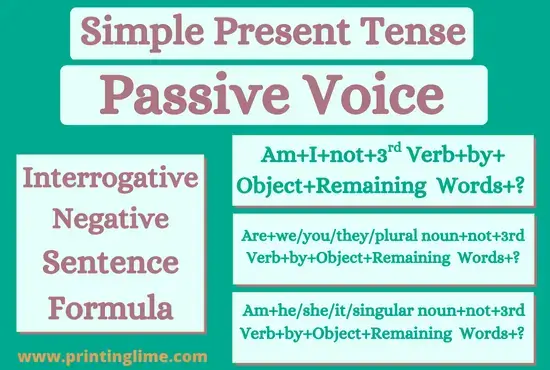
Examples of Interrogative-Negative Sentences of Simple Present Tense Passive Voice
Following are some examples of interrogative-negative sentences in the simple present tense (passive voice).
- Does the manager not check the report before submission?
- Is the report not checked by the manager before submission?
- Do the workers not clean the streets every morning?
- Are the streets not cleaned by the workers every morning?
- Does the driver not wash the car on weekends?
- Is the car not washed by the driver on weekends?
- Does the teacher not teach the lessons carefully?
- Are the lessons not taught by the teacher carefully?
- Does the waiter not serve the food on time?
- Is the food not served by the waiter on time?
- Does the gardener not water the flowers daily?
- Are the flowers not watered by the gardener daily?
- Does the customer not pay the bill before leaving?
- Is the bill not paid by the customer before leaving?
- Do the travelers not book the tickets online?
- Are the tickets not booked by the travelers online?
- Does the editor not update the news every hour?
- Is the news not updated by the editor every hour?
- Does the secretary not send the emails daily?
- Are the emails not sent by the secretary daily?
